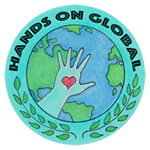OUR STORY
OUR STORY
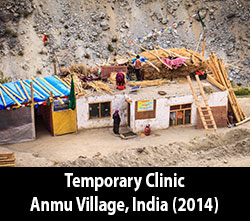
In 2014 Valerie Hellermann, Project Manager of the Tibetan Children’s Education Foundation was invited by Geshe Yonten to access the healthcare situation in the remote region of Zanskar, India.
The team of doctors, nurses, and support staff, trekked into the villages and came to understand the challenges of health care delivery in this remote region of the Himalayas. The team set up a small temporary clinic built onto a teahouse in Anmu village and saw approximately 200 patients.
The Dalai Lama was in Zanskar at the time and Geshe Yonten arranged an audience with him. The Dalai Lama discussed the importance of cultural preservation and the necessity of modern technology. He was committed to providing both allopathic and traditional medicines to this region and funded the construction of a hospital to be built in Padum. The Dalai Lama told the group, “This is the last authentic Buddhist Culture and you must continue this work.”
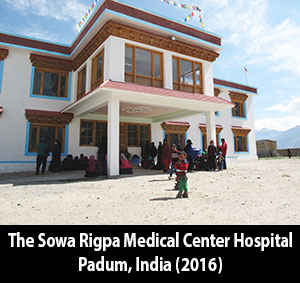
We then met members of the Zanskar Health Committee and we began discussions to bring in a medical camp. The Sowa Rigpa Medical Center Hospital, built by His Holiness the Dalai Lama through the Dalai Lama Fund, was completed in early 2016. In June 2016, Hands On Global, a newly formed non-profit, brought the first medical camp and opened the Hospital in Padum. The 20 day camp provided the first ever cervical cancer screening via colposcopy for 300 women. We did pediatric screening with emphasis on congenital heart problems, general medical screening, pre and peri-natal exams, physical therapy and massage. We did ultrasounds and EKG’s as well as eye and hearing exams. Due to the generous donations of supporters we were able to purchase much needed medical equipment such as the portable ultrasound , the EKG, ophthalmoscopes, otoscopes, etc. All medical equipment was left for the hospital. Funds were also used for the purchase of medications.
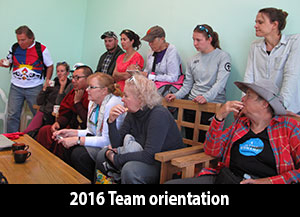 We held daily clinics for the general public of Zanskar and treated 1679 patients. A group went out into the villages and provided information about the hospital and did basic health screenings. We did education on nutrition, maternal and child health, western medicine and created a policy manual for the hospital based on India standards and the WHO rural medical clinic policy. The team used an educational video on cervical cancer translated into Zanskari played on I Pads. This was a critical tool for women to understand the need for cervical screening and it worked very well.
We held daily clinics for the general public of Zanskar and treated 1679 patients. A group went out into the villages and provided information about the hospital and did basic health screenings. We did education on nutrition, maternal and child health, western medicine and created a policy manual for the hospital based on India standards and the WHO rural medical clinic policy. The team used an educational video on cervical cancer translated into Zanskari played on I Pads. This was a critical tool for women to understand the need for cervical screening and it worked very well.
The Medical Camp worked with 11 local Zanskari translators who were medical students, pharmacy students or university students applying to medical school. The HOGI team worked side by side with them, teaching basic health care assessment, EKG technology, vital sign technology, pharmacy – drug distribution including side effects and proper mode of ingestion and cervical cancer screening. Teaching these local Zanskari youths to manage, treat and provide healthcare was a major component of this camp.
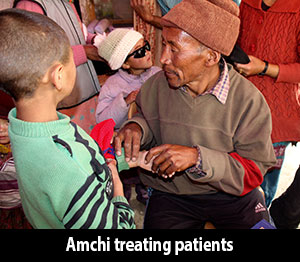
The vision for this hospital is for both allopathic medicine and Amchi medicine to work together. We collaborated with the local Amchi treating patients daily and the acupuncture team from Singapore there for 5 days.
Follow up and referrals were made to ophthalmology, and dental clinics being scheduled in Leh, 2 days away by jeep. Referrals were made to the Leh Heart Institute for pediatric heart issues and the Himalayan Women’s Health Foundation for positive gynocology patients.
2017 Medical Camp
In collaboration with the Zanskar Health Committee, Himalayan Women’s Health Project, Ladakh Heart Institute and Himalayan Health Project, Hands on Global Medical Camp returned for the second year with an expanded international team of providers and support personnel. We were invited to attend His Holiness the Dalai Lama’s inauguration of the hospital. His Holiness the Dalai Lama visited the hospital room by room asking questions and personally thanking the Hands On Global team members for the work we are doing.
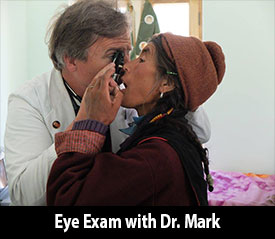 Our USA team of 17 members included 5 providers, 3 nurses, massage therapy, occupational therapist, 4 medical support, documentary photographer, 2 engineers (to investigate alternative technology to provide heat to the hospital building), a 14 year old student and a documentary film crew from Good Blood Media. Five team members from 2016 continued support for the project and returned to Zanskar this year providing leadership and direction to the 2017 team.
Our USA team of 17 members included 5 providers, 3 nurses, massage therapy, occupational therapist, 4 medical support, documentary photographer, 2 engineers (to investigate alternative technology to provide heat to the hospital building), a 14 year old student and a documentary film crew from Good Blood Media. Five team members from 2016 continued support for the project and returned to Zanskar this year providing leadership and direction to the 2017 team.
We had the privilege of being joined by 11 providers from Brazil (Dharma Institute). They were specialists in cardiology, pediatrics, emergency medicine, psychology, high risk OB and physical therapy. They worked side by side with us for 5 days. Our team also included a Swiss nurse and her support team from India. A newly graduated Muslim surgeon from Northern India volunteered with us for 10 days. This was a successful International team effort and the beginning of deep friendships and commitments to continue working together.
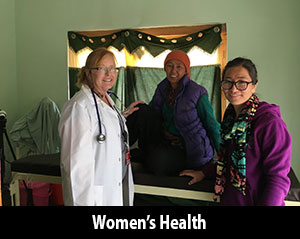 Zanskar support staff consisted of 12 volunteer translators. Many worked with us last year and returned eager to serve. We cannot emphasize enough how indispensable their active participation is for the success of our projects. We could not do our work without them. They are bright and eager to serve their community. Many of them are interested in careers in medicine (Physicians, Nurses, Physical Therapists, Pharmacists). Hands On Global hopes to assist them with educational scholarships in the future. We saw over 1500 patients, many sicker than last year. We treated 64 cases of pneumonia, many of them children urgently needing antibiotics.
Zanskar support staff consisted of 12 volunteer translators. Many worked with us last year and returned eager to serve. We cannot emphasize enough how indispensable their active participation is for the success of our projects. We could not do our work without them. They are bright and eager to serve their community. Many of them are interested in careers in medicine (Physicians, Nurses, Physical Therapists, Pharmacists). Hands On Global hopes to assist them with educational scholarships in the future. We saw over 1500 patients, many sicker than last year. We treated 64 cases of pneumonia, many of them children urgently needing antibiotics.
EDUCATION:
This year we made several educational videos translated into Zanskari and played on iPads. These videos were used to explain Western Medicine and how to take allopathic medicines. Videos were made about hypertension and h.pylori, explaining the diagnosis, the effect of the disease and the importance of properly taking the prescribed medication. We again used the video to educate women on the importance of cervical cancer screening. These were critical educational tools for Zanskaris to begin to understand how allopathic medicine works.
PHYSICAL THERAPY & MASSAGE:
Many Zanskaris suffer from arthritis- knees, backs, shoulders and hips. Allopathic medicine can only offer mild anti-inflammatory pain relievers. Joint replacements are not an option in Zanskar. The PT and massage team offered them relief. A massage visibly eased many painful joints. Pts were taught some exercises, stretches and self and partner massage to continue relief.
REFERRALS:
Medical referrals are an extremely important aspect of our camps and something we cannot easily determine compliance. There are many reasons patients may not get the recommended follow up. A medical referral system was developed and documentation was great on our side. Based on in-depth discussions, arrangements were made for follow at the Himalayan Health Project Lamdon Clinic and the Ladakh Heart Institute (LHI). The LHI was hosting an International physician’s Medical Camp of specialists in gastroenterology, nephrology and cardiology for three days in August. The Himalayan Women’s Health Foundation was holding its annual OB/GYN clinic with Dr. Swee Chong from Singapore and positive cervical screenings were referred there for LEEP procedures. More complex cases and those needing immediate treatments were referred to other hospitals in India.
TRIAGE:
Our Physicians recommended many patients to go to Leh or Kargil hospitals for specific lab tests or to seek more intense levels of care. There were 9 patients sent to Kargil or Leh hospitals with an acute urgent situation. Currently there is no ambulance and patients are transported by taxis. It takes 12-14 hours to get to Kargil, the nearest district hospital with limited resources, and another full day drive to get to hospitals in Leh or Srinagar. Many of the patient need financial support to make the trip. Hands On Global paid for their taxi transportation, sometimes transportation for their support person and money for food. The helicopter situation for medical evacuation was explained by the Zanskar Health Committee. During the summer when the road is open for motorized vehicles the helicopter will never come for a patient unless it is a private helicopter company. During the winter when there is no possibility of road transport the army may send a helicopter. It is not clear who decides who gets flown to Leh and who doesn’t. Due to weather it can sometimes take a month for this to happen. For situations such as acute appendicitis, emergency c sections, and other medical emergencies this can be a lethal wait.
LAB-DIAGOSTIC CAPABILITIES:
We had urine dip tests and h.pylori finger tests. We need to be able to run basic labs at the time we see the patient. A Point of Care Blood Analyzer with cartridges would be ideal. Although this may be expensive, it is significantly less than building and equiping a lab. Additionally, the reagents are temperature sensitive and cannot be operated in a building without heat.
INFRASTRUCTURE:
Two Engineers were on the team this year tasked with finding alternative methods to heat the hospital. Zanskaris need the hospital to be open during these long cold winters when people get really sick.
Hands On Global brought over 150 lbs. of donated and discounted medicines and vitamins from US foundations: Brother’s Brother Foundation, Map International and Supplies Overseas. This year, despite better preparation, we ran out of needed medications and struggled to get more. Medications have to be ordered from Kargil, Srinagar or Leh, all days away.

In 2014 Valerie Hellermann, Project Manager of the Tibetan Children’s Education Foundation was invited by Geshe Yonten to access the healthcare situation in the remote region of Zanskar, India.
The team of doctors, nurses, and support staff, trekked into the villages and came to understand the challenges of health care delivery in this remote region of the Himalayas. The team set up a small temporary clinic built onto a teahouse in Anmu village and saw approximately 200 patients.
The Dalai Lama was in Zanskar at the time and Geshe Yonten arranged an audience with him. The Dalai Lama discussed the importance of cultural preservation and the necessity of modern technology. He was committed to providing both allopathic and traditional medicines to this region and funded the construction of a hospital to be built in Padum. The Dalai Lama told the group, “This is the last authentic Buddhist Culture and you must continue this work.”

We then met members of the Zanskar Health Committee and we began discussions to bring in a medical camp. The Sowa Rigpa Medical Center Hospital, built by His Holiness the Dalai Lama through the Dalai Lama Fund, was completed in early 2016. In June 2016, Hands On Global, a newly formed non-profit, brought the first medical camp and opened the Hospital in Padum. The 20 day camp provided the first ever cervical cancer screening via colposcopy for 300 women. We did pediatric screening with emphasis on congenital heart problems, general medical screening, pre and peri-natal exams, physical therapy and massage. We did ultrasounds and EKG’s as well as eye and hearing exams. Due to the generous donations of supporters we were able to purchase much needed medical equipment such as the portable ultrasound , the EKG, ophthalmoscopes, otoscopes, etc. All medical equipment was left for the hospital. Funds were also used for the purchase of medications.

We held daily clinics for the general public of Zanskar and treated 1679 patients. A group went out into the villages and provided information about the hospital and did basic health screenings. We did education on nutrition, maternal and child health, western medicine and created a policy manual for the hospital based on India standards and the WHO rural medical clinic policy. The team used an educational video on cervical cancer translated into Zanskari played on I Pads. This was a critical tool for women to understand the need for cervical screening and it worked very well.
The Medical Camp worked with 11 local Zanskari translators who were medical students, pharmacy students or university students applying to medical school. The HOGI team worked side by side with them, teaching basic health care assessment, EKG technology, vital sign technology, pharmacy – drug distribution including side effects and proper mode of ingestion and cervical cancer screening. Teaching these local Zanskari youths to manage, treat and provide healthcare was a major component of this camp.

The vision for this hospital is for both allopathic medicine and Amchi medicine to work together. We collaborated with the local Amchi treating patients daily and the acupuncture team from Singapore there for 5 days.
Follow up and referrals were made to ophthalmology, and dental clinics being scheduled in Leh, 2 days away by jeep. Referrals were made to the Leh Heart Institute for pediatric heart issues and the Himalayan Women’s Health Foundation for positive gynocology patients.
2017 Medical Camp
In collaboration with the Zanskar Health Committee, Himalayan Women’s Health Project, Ladakh Heart Institute and Himalayan Health Project, Hands on Global Medical Camp returned for the second year with an expanded international team of providers and support personnel. We were invited to attend His Holiness the Dalai Lama’s inauguration of the hospital. His Holiness the Dalai Lama visited the hospital room by room asking questions and personally thanking the Hands On Global team members for the work we are doing.

Our USA team of 17 members included 5 providers, 3 nurses, massage therapy, occupational therapist, 4 medical support, documentary photographer, 2 engineers (to investigate alternative technology to provide heat to the hospital building), a 14 year old student and a documentary film crew from Good Blood Media. Five team members from 2016 continued support for the project and returned to Zanskar this year providing leadership and direction to the 2017 team.
We had the privilege of being joined by 11 providers from Brazil (Dharma Institute). They were specialists in cardiology, pediatrics, emergency medicine, psychology, high risk OB and physical therapy. They worked side by side with us for 5 days. Our team also included a Swiss nurse and her support team from India. A newly graduated Muslim surgeon from Northern India volunteered with us for 10 days. This was a successful International team effort and the beginning of deep friendships and commitments to continue working together.

Zanskar support staff consisted of 12 volunteer translators. Many worked with us last year and returned eager to serve. We cannot emphasize enough how indispensable their active participation is for the success of our projects. We could not do our work without them. They are bright and eager to serve their community. Many of them are interested in careers in medicine (Physicians, Nurses, Physical Therapists, Pharmacists). Hands On Global hopes to assist them with educational scholarships in the future. We saw over 1500 patients, many sicker than last year. We treated 64 cases of pneumonia, many of them children urgently needing antibiotics.
EDUCATION:
This year we made several educational videos translated into Zanskari and played on iPads. These videos were used to explain Western Medicine and how to take allopathic medicines. Videos were made about hypertension and h.pylori, explaining the diagnosis, the effect of the disease and the importance of properly taking the prescribed medication. We again used the video to educate women on the importance of cervical cancer screening. These were critical educational tools for Zanskaris to begin to understand how allopathic medicine works.
PHYSICAL THERAPY & MASSAGE:
Many Zanskaris suffer from arthritis- knees, backs, shoulders and hips. Allopathic medicine can only offer mild anti-inflammatory pain relievers. Joint replacements are not an option in Zanskar. The PT and massage team offered them relief. A massage visibly eased many painful joints. Pts were taught some exercises, stretches and self and partner massage to continue relief.
REFERRALS:
Medical referrals are an extremely important aspect of our camps and something we cannot easily determine compliance. There are many reasons patients may not get the recommended follow up. A medical referral system was developed and documentation was great on our side. Based on in-depth discussions, arrangements were made for follow at the Himalayan Health Project Lamdon Clinic and the Ladakh Heart Institute (LHI). The LHI was hosting an International physician’s Medical Camp of specialists in gastroenterology, nephrology and cardiology for three days in August. The Himalayan Women’s Health Foundation was holding its annual OB/GYN clinic with Dr. Swee Chong from Singapore and positive cervical screenings were referred there for LEEP procedures. More complex cases and those needing immediate treatments were referred to other hospitals in India.
TRIAGE:
Our Physicians recommended many patients to go to Leh or Kargil hospitals for specific lab tests or to seek more intense levels of care. There were 9 patients sent to Kargil or Leh hospitals with an acute urgent situation. Currently there is no ambulance and patients are transported by taxis. It takes 12-14 hours to get to Kargil, the nearest district hospital with limited resources, and another full day drive to get to hospitals in Leh or Srinagar. Many of the patient need financial support to make the trip. Hands On Global paid for their taxi transportation, sometimes transportation for their support person and money for food. The helicopter situation for medical evacuation was explained by the Zanskar Health Committee. During the summer when the road is open for motorized vehicles the helicopter will never come for a patient unless it is a private helicopter company. During the winter when there is no possibility of road transport the army may send a helicopter. It is not clear who decides who gets flown to Leh and who doesn’t. Due to weather it can sometimes take a month for this to happen. For situations such as acute appendicitis, emergency c sections, and other medical emergencies this can be a lethal wait.
LAB-DIAGOSTIC CAPABILITIES:
We had urine dip tests and h.pylori finger tests. We need to be able to run basic labs at the time we see the patient. A Point of Care Blood Analyzer with cartridges would be ideal. Although this may be expensive, it is significantly less than building and equiping a lab. Additionally, the reagents are temperature sensitive and cannot be operated in a building without heat.
INFRASTRUCTURE:
Two Engineers were on the team this year tasked with finding alternative methods to heat the hospital. Zanskaris need the hospital to be open during these long cold winters when people get really sick.
Hands On Global brought over 150 lbs. of donated and discounted medicines and vitamins from US foundations: Brother’s Brother Foundation, Map International and Supplies Overseas. This year, despite better preparation, we ran out of needed medications and struggled to get more. Medications have to be ordered from Kargil, Srinagar or Leh, all days away.
